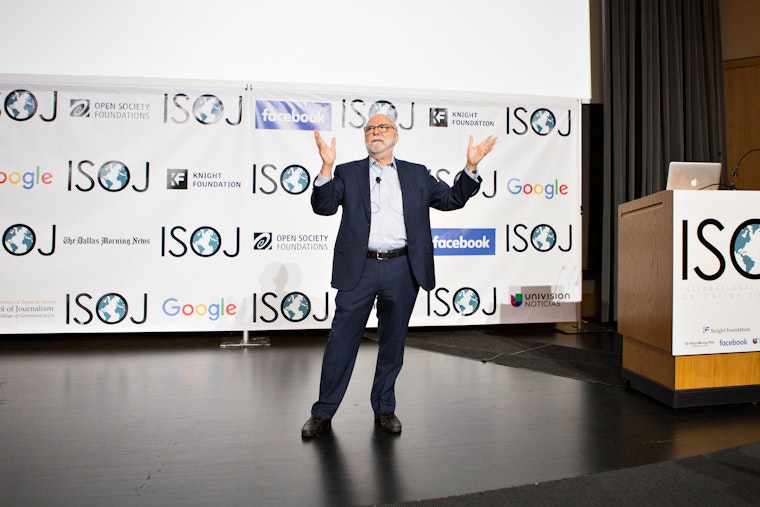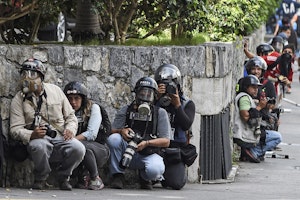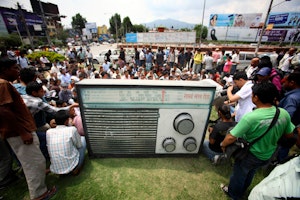Q&A: What We Can Learn from Journalists in Latin America

In the face of extreme political pressure, violence, and the basic need to keep paying the bills, Latin American journalists have found new ways to reach their audiences and provide a check on those in power. Amina Boubia from the Open Society Foundation’s Program on Independent Journalism spoke with Professor Rosental Alves, director of the Knight Center for Journalism in the Americas, about their efforts to share stories about innovation in journalism in Latin America.
Why have you made sharing knowledge about innovation in journalism—with a particular focus on Latin America—a key aspect of your work?
Due to the digital revolution, the very nature of the work that independent journalists do is under threat. The question—can they earn a living, without compromising the quality and focus of their work?—is a real one. Knowledge sharing is a critically important part of the answer.
Unfortunately, there is not much opportunity for this sort of sharing in Latin America, and from Latin America to other parts of the world where journalists are also under threat.
On our trilingual blog, in Spanish, Portuguese, and English, we cover journalism innovation and trends in Latin America and the Caribbean, as well as press freedom issues.
We highlight business models, sustainability efforts, academic research on the profession, profiles of successes and missteps, legal issues, violence against journalists, access to information, and more.
Could you give us a few examples of journalism initiatives you have reported on?
Yes. We have been sharing with the world many creative and innovative journalism initiatives. We published two e-books in our three main languages of the region—Innovative Journalism in Latin America (2017) and Innovators in Latin American Journalism (2018)—that detail dozens of examples.
Here are two:
- Chequeado [website in Spanish] was the first fact-checking organization in Latin America and one of the first in the world, and it has been playing an important role in spreading methods of verification of public discourse throughout the region, while becoming self-sustainable and relevant in Argentina.
- In Paraguay, we found an extraordinary group of journalists, designers and developers who launched Memetic Media, a startup that has reached younger audiences with reporting on the environment and other serious issues through its innovative illustration and storytelling techniques, as in its flagship publication, El Surtidor [website in Spanish].
Any examples from Venezuela, where journalists face some of the most difficult conditions in the world?
There are many examples from Venezuela. Journalists there have founded innovative news organizations that have been resisting censorship and playing an important role in the country’s complicated situation.
Here are three of the cases we covered in our series and e-books:
- Efecto Cocuyo was created by three female investigative reporters who lost their jobs in newspapers.
- Runrunes was created by an investigative journalist who lost his job—for political reasons—in the mainstream media. Thanks to the fact that he had a couple million followers on Twitter, he began his own independent media outlet on the web.
- El Pitazo is a unique kind of news organization, led by professional journalists but produced with contributions from hundreds of citizen journalists spread throughout all 24 Venezuelan states.

To what extent does such knowledge sharing contribute to strengthening journalism?
It is clear that the digital revolution has been destroying the business models of traditional media, creating an existential threat to independent journalism. The very existence of open societies depends on a free and independent press, so as spaces close for free expression in many countries, we need more knowledge sharing among journalists about how to keep journalism alive.
All the great examples we covered have the potential to inspire journalists in other countries in the region or in other parts of the world who are facing similar challenges.
Chequeado from Argentina inspired several fact-checking initiatives in other countries. Similarly, the experiences of journalists in Brazil and Mexico putting together bigger fact-checking operations involving a consortium of media outlets has inspired others.
Why is it important to report on journalism innovation in Latin America and the Caribbean in particular?
Latin America and the Caribbean have a lot to teach us. The region is often overlooked. In some instances, newsrooms and journalists in the region have been forced to embrace transitions before the press in other parts of the world. For example, El Faro in El Salvador became the first digital native news site in Latin America in 1998 and for years was a very small organization staffed by journalists working for free. It later evolved into a company that has been experimenting with very innovative ways to become sustainable. So, it has years of experience in online journalism that other newsrooms can learn from. That’s partly why we profiled El Faro in our innovators series.
So innovation isn’t a thing of the “North?”
This is a great question. Although the journalism crisis is a global phenomenon, the conversation about rapid changes in the media environment and the experimentation with new models has focused by and large on the rich North. It has been as if nothing relevant was going on in the emerging South. Rarely have cases from the South been presented and discussed in the international conferences or forums of the news media industry. It’s as though the South has just been waiting for the solutions that would come from the North.
I believe this has been a big mistake, as journalists and media organizations in the South have been very creative and innovative, experimenting with new models that could be inspirational in other parts of the world. We need to create more opportunities for South-North and South-South exchanges of information and collaboration if we want to help independent journalism find its way to survive and thrive in the digital era.
The Knight Center for Journalism in the Americas is a grantee of the Open Society Foundations.

